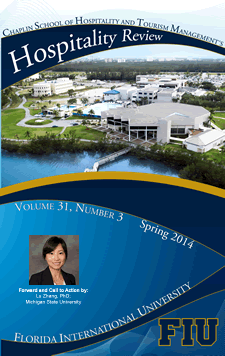Volume 31, Issue 3 (2014) FIU Hospitality Review v.31 i.3
Forward and call to attention
The number of hospitality graduate programs has increased from 25 in the 1990s to 31 in 2013 (Van Hoof, Wu, Zhang, and Mattila, 2013), which has demonstrated a strong growth in hospitality graduate education. Despite the fact that hundreds of students are working towards a MS or PhD degree in hospitality, research on hospitality graduate education is relatively scant, and most attention on hospitality education has been devoted at the undergraduate level (e.g., Tews and Van Hoof, 2011). More research is needed on topics that relate to hospitality graduate education, which is the foundation of hospitality management education and research. In the current issue, Van Hoof and colleagues (2014) set out to understand the factors that influence students’ choices of hospitality graduate programs. Results indicate that students made their decisions mainly based on their perceptions of the admission processes, faculty interactions, living conditions, and the reputations of the programs, faculties and locations.
Call to Action:
programs. FIU Hospitality Review, 26 (1), 47-54.
Full Issue
Hospitality Review Volume 31 Issue 3 2014
FIU Hospitality Review
Articles
The Study of Clustering of Taiwanese Tourists' Motivations to Hong Kong
Diann Newman, Ed.D.; Yung-Kun Sung*; Hung-Sheng Lai; and Wei-Ni Shyu
Gimme' A Break: Offering Sabbaticals as an Optional Leave Benefit in the Lodging Industry
Kimberly J. Harris, Gretchen L. Rivera, and Cydna Bougae
Hospitality Graduate Students’ Program Choice Decisions: Implications for Faculty and Administrators
Hubert B. Van Hoof, Luorong Wu, and Lu Zhang
A Review of Merger and Acquisition Wave Literature: Proposing Future Research in the Restaurant Industry
Jewoo Kim and Tianshu Zheng
Reaching an Underserved Wine Customer: Connecting with the African American Wine Consumer
Rhonda Hammond, Sandra Sydnor, and Eunjoo Kang
An Evaluation of Three Nutrition Labeling Formats for Restaurant Menus
Li Ge, Carl Behnke, and Barbara Almanza

Publisher:
Mike Hampton, Dean, Florida International University
Editor in Chief:
Randall S. Upchurch, Associate Dean-Academics, Florida International University
Managing Editor:
Catherine Curtis, Assistant Professor, Oklahoma State University
Communications Editor:
Nathan Dodge, Assistant Director, Florida International University
Editorial Board:
Barbara Almanza, Professor, Purdue University
Mark Bonn, Professor, Florida State University
Robin DiPietro, Associate Professor & Director of the IIFRE, University of South Carolina
Chekitan Dev, Professor, Cornell University
Nicholas Hadgis, Dean, Widener University
Kimberly Harris, Professor, Florida State University
Leonard Jackson, Associate Professor, University of Memphis
Michael Kasavana, Professor, Michigan State University
A.J. Singh, Associate Professor, Michigan State University
Sandy Strick, Director of Graduate Studies, University of South Carolina
Hubert Van Hoof, Professor, The Pennsylvania State University
Technical Assistant Editor:
Dale Gomez, Director, University Computer Systems, Florida International University




